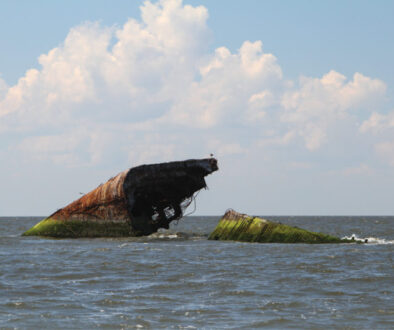Your friend, Charlie
When Kathy Brand wanted to teach her sixth grade class about World War II, she called out the army—literally. In the early 1990s, as the Canton, Ohio special-needs educator prepared her lesson plan, she learned that the U.S. Army’s 69th Infantry Division was planning a reunion in Cincinnati. Brand arranged a meeting with the vets, and asked them to participate in a unique educational experiment: to write letters to the kids in the present tense, “as if the war were occurring now,” says Brand.

“When the veterans started talking about the old times, it was almost as if time was not a barrier,” says Brand. “You could feel that raw emotion; we felt the kids would connect to that emotional part of leaving the family, being young, and being at war. So we matched up the vets with the kids, and they started writing.
The most faithful correspondent was Cape May resident Charlie Locke, who enlisted in the Army right out of high school in 1942, and served until the end of the war in 1945.
“With Charlie’s letters, we knew we had something,” Brand says. “Oh my God, they gave us goosebumps.”
Back in New Jersey, Locke welcomed the assignment. He had just lost his wife of 49 years, Doris, and was “feeling kind of bad,” he says. “Writing to the kids was like therapy for me.”
Twice a month, Locke regaled his pen pal “Johnny” with tales of basic training in Florida and Mississippi, and anecdotes about his time aboard a troop ship to Europe. He described his experiences as an infantryman on and behind the front lines. But he was careful never to share stories about combat. “I tried to keep it light. I didn’t go into deep detail by any means,” says Locke.
Locke has been “very judicious” about sharing his war stories over the years, observes his daughter, Donna McCool, who lives in North Cape May. “He shares only the ones he could spin into amusing anecdotes or examples of great friendships and camaraderie. He never wanted to discuss the horror side.”
In a typical letter, dated Thanksgiving 1944, he wrote, “We are on a liberty ship in the very rough, very cold North Atlantic. … I feel sad because it’s the first Thanksgiving that I haven’t been home with my family.” Though the soldiers enjoyed a turkey dinner, he added, they had to eat it in the mess hall—standing up. “We have been on the high seas for 10 days,” he continued. “The waves and swells are way above our ship. We are thankful that a German sub didn’t find us. … I hope we will see the shore soon.”
He signed it, “Your friend, Charlie,” along with his name, rank and serial number.
“Charlie’s letters were instantly a hit with the entire sixth grade Language Arts and Social Studies classes,” says Brand. “The entire class adopted Charlie, and even sent him birthday cards for his mail call when he turned 18.”
Of course, making landfall would be a mixed blessing for the troops—they would finally join the fray, and face the full devastation of war. Luckily, Locke escaped harm; though called to serve in the Battle of the Bulge, at the last minute he was spared that deadly siege, possibly because of his age.
But he saw his share of action in England, France, and Germany. As a Jeep driver in London during the Blitzkrieg, he remembers drinking beer in a pub when sirens sounded an air raid. The English had become so accustomed to the missiles, Locke says, “They just kept drinking their beer. The bombs were so close the glasses were rattling on the shelves.” He and his companion looked at each other, and then agreed, “If they’re not leaving, we’re not leaving.” He also saw action in the Ardennes Forest, in the final days of the Battle of the Bulge. The German offensive at Christmastime 1944 claimed more Allied casualties than any other operation of the war.

Long after the original classroom project ended and the other veterans had stopped writing, Locke continued to correspond with the class. Then, about a year after his first letter, says Brand, he wrote his last.
“I am sorry,” Locke wrote to the school children. “It is too painful for me to write as if this is happening now.”
As always, the letter was signed, “Your friend, Charlie.”
But the students weren’t willing to relinquish their cherished pen pal. With Brand’s help, they drew on Locke’s letters to create a play, “The Fighting 69th,” and presented it at their school, Newman Elementary in Massillon, Ohio. Their guests of honor: Charlie Locke and other members of the 69th Infantry.
At first Locke declined to attend, saying the children expected to meet a 20-year-old boy, not an “old man.”
“But in their minds, he was young,” says Brand. Encouraged by his daughter Donna, Locke agreed to go, and he was greeted like a conquering hero. “We turned the whole school into a homecoming for Charlie, with about 300 kids with flags and signs saying, ‘Welcome, 69th Infantry,’” Brand recalls.
At the conclusion of the play—a series of vignettes about the war, with every student performing—“There was not a dry eye,” says Brand. “In the last scene, Charlie was talking about coming home and the friends he had lost, and the students walked off stage, one by one… You can imagine how powerful that was.” The show ended with a chorus of God Bless America.
A luncheon followed, in which Locke and other members of the division got a chance to meet and chat with their sixth-grade pen pals. “The years were not there,” says Brand. “It was true friendship. All those kids were Charlie’s friends.” The play was eventually staged again for the community, to a packed house, and at another reunion of the 69th Infantry held in Virginia.
As it turned out, Locke’s military service would play a pivotal role in his the rest of his life. He was still in Europe when he heard from the father of a fellow division member who had died in Leipzig, Germany shortly after the surrender. Charles J. Dougherty implored Locke to find out how his son had been killed.

The Art Museum 
I was nineteen years old here 



We just got our papers to go home! I am third from the right 
With a Russian soldier.
I am on the right.

In front of Town Hall.
I am on the right.
Once again, Locke took pen in hand. “You’re very foolish,” he wrote to the Philadelphia businessman, “but if that’s what you want, I will do it.” He eventually learned that the young serviceman had been shot by a sniper.
Back home, Dougherty, who owned a Philadelphia produce auction house, “more or less adopted me as his son,” says Locke, and offered him a job as a clerk, starting at $20 a week. Locke would eventually work his way up to auctioneer, the youngest in the company’s history. Meanwhile, he resumed his relationship with his childhood sweetheart, Doris, and after a brief break, they married. They had two children, Chuck and Donna, and eventually moved from the Collingswood area to Cape May. And years later, when the couple traveled to Europe, they paid their respects at young Dougherty’s gravesite, marked by a plain white cross, in a national cemetery in the Netherlands.
As for Locke’s connection to Ohio – needless to say, it has endured to this day. Not only has Brand stayed in touch with Locke by phone and by mail, she and fellow teacher Rachel Stien have also become frequent visitors to South Jersey.
“Charlie’s friendship pulled us to Cape May,” says Brand. She describes him as “a gem … like one of the jewels found at Sunset Beach.”
The kids of Newman Elementary—now all grown up—also remember their friend Charlie, and he remembers them with lingering fondness. “After Mom passed, Dad had very little interest in anything for a long while, and this project really helped bring him out of that a bit,” says McCool. “He looked forward to getting the student’s letters, and put great thought into his responses. We are swiftly losing the WWII generation, and it was a great gift that the students were able to question a veteran who experienced it. It’s something I hope they grow to appreciate even more as they grow older.”
As his daughter, she adds, “Of course I think my Dad is an incredible man—the epitome of resilience and the prime example of a good man. The way he’s open to new friendships with disparate types of people is one of his most wonderful qualities. His social circle continues to expand even at this age … and is an example of why we should always be open to new things that come into our lives and appreciate the gifts we receive.”
“He told us recently he tried to live each day to the fullest, as he knew he was lucky to survive,” says Stien. “He realized that each day was a gift.”
“The heart of it is the friendships and the love of family and the love of country,” says Brand.
“It’s living history,” says Locke’s son, Chuck.
But Charlie Locke should have the last word. “As you can see, I’ve had a wonderful life. There have been two big bumps in the road—the war, and when Doris passed. But I’ve appreciated life so much. I had a great marriage, two great kids, and a job I loved. And it all happened because of my being in the service.”



